Words that have the suffix ant – Words that have the suffix ‘-ant’ occupy a fascinating corner of the English language, revealing a rich history, distinct morphological characteristics, and a wide range of semantic meanings. This exploration delves into the etymology, morphology, and semantic analysis of words with this suffix, offering insights into their contextual usage and comparative analysis with ‘-ent’ words.
From their Latin and Greek origins to their current usage, words with the suffix ‘-ant’ have evolved to convey specific characteristics or qualities. They can transform nouns into adjectives, creating a diverse array of word classes. Their semantic meaning often indicates a particular attribute or tendency.
Etymology and History of Words with the Suffix ‘-ant’
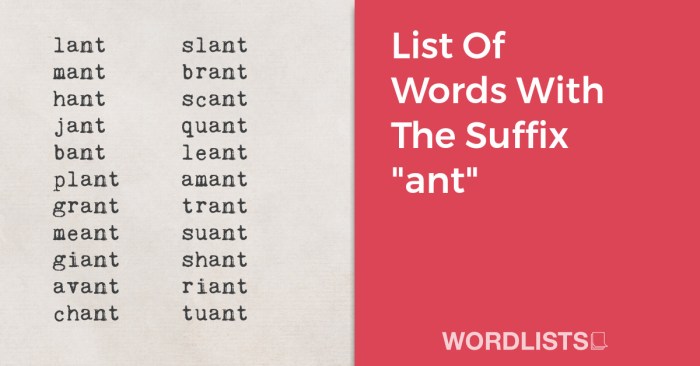
The suffix ‘-ant’ has a rich history, tracing its roots back to Latin and Greek. In Latin, the suffix ‘-ans’ was used to form present participles of verbs, indicating an ongoing action or state of being. This suffix was later adopted into English through Old French, where it evolved into ‘-ant’.
Greek and Latin Roots, Words that have the suffix ant
The suffix ‘-ant’ is derived from the Latin suffix ‘-ans’, which in turn originated from the Greek suffix ‘-ont’. Both ‘-ans’ and ‘-ont’ were used to form present participles, indicating an ongoing action or state of being. For example, the Latin word ‘amans’ (loving) is derived from the verb ‘amare’ (to love), and the Greek word ‘didous’ (giving) is derived from the verb ‘didomi’ (to give).
Evolution in English
When the suffix ‘-ant’ was adopted into English, it was initially used to form present participles, similar to its Latin and Greek origins. However, over time, the suffix began to be used more broadly to form adjectives that describe a characteristic or quality.
For example, the word ‘elegant’ (from the Latin ‘elegans’) describes someone who is graceful or stylish, and the word ‘important’ (from the Latin ‘importare’) describes something that is significant or weighty.
Morphological Characteristics of Words with the Suffix ‘-ant’
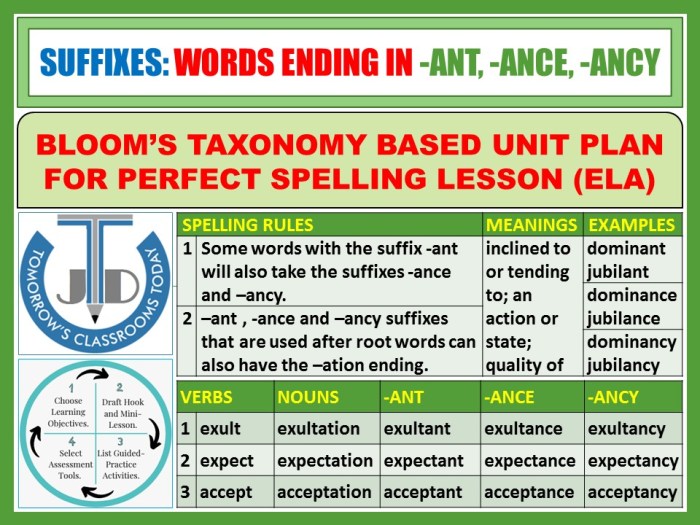
The suffix ‘-ant’ plays a significant role in the morphological structure of words, influencing their part of speech and meaning. It primarily transforms nouns into adjectives, but it can also be added to verbs and other word classes.
When ‘-ant’ is added to a noun, it typically denotes a person or thing that possesses or exhibits the quality or characteristic expressed by the noun. For instance, ‘assistant’ is derived from ‘assist,’ indicating someone who provides assistance. Similarly, ‘important’ originates from ‘importance,’ implying something of great significance.
Part of Speech Alteration
The suffix ‘-ant’ primarily converts nouns into adjectives. This transformation allows the word to describe or modify other nouns. For example, ‘combatant’ (noun) becomes ‘combative’ (adjective), describing a person who engages in combat. Additionally, ‘-ant’ can be added to verbs to form present participles, which function as adjectives.
For instance, ‘dance’ (verb) becomes ‘dancing’ (present participle), describing an ongoing action.
Word Classes Formed Using ‘-ant’
The suffix ‘-ant’ is versatile and can be used to form various word classes, including:
- Adjectives:‘abundant,’ ‘dominant,’ ‘repentant’
- Nouns:‘attendant,’ ‘inhabitant,’ ‘supplicant’
- Present Participles:‘advancing,’ ‘departing,’ ‘laughing’
Contextual Usage of Words with the Suffix ‘-ant’
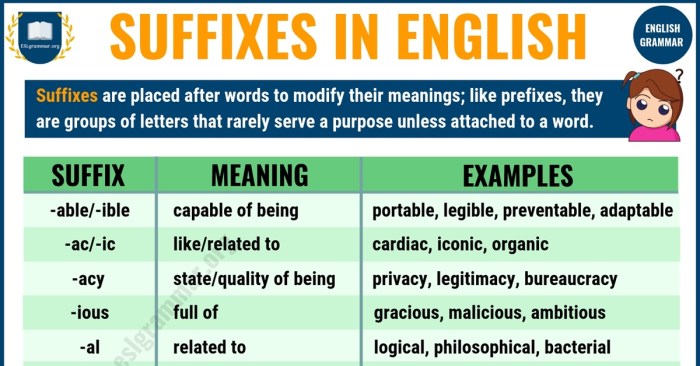
Words with the suffix ‘-ant’ are typically adjectives that describe someone or something that performs or tends to perform a specific action. The suffix ‘-ant’ can also be used to form nouns that refer to a person or thing that performs a specific action.
In the realm of suffixes, the ‘-ant’ suffix denotes a person who performs an action. Take, for instance, the word ‘consultant’, an individual who consults. If you’re seeking a dichotomous key lab answer key, you can find one here . Returning to our suffix exploration, the ‘-ant’ suffix adds a distinct flavor to words, highlighting the agent performing an action.
The suffix ‘-ant’ can affect the tone and register of a word. Words with the suffix ‘-ant’ can be used in formal or informal contexts, and they can have a positive or negative connotation. For example, the word ‘arrogant’ has a negative connotation and is typically used in a formal context, while the word ‘exuberant’ has a positive connotation and can be used in either a formal or informal context.
Formal Context
Words with the suffix ‘-ant’ are often used in formal contexts, such as academic writing, professional communication, and legal documents. In these contexts, words with the suffix ‘-ant’ can help to convey a sense of authority and expertise. For example, the word ‘defiant’ is often used in legal contexts to describe someone who refuses to obey an order.
Informal Context
Words with the suffix ‘-ant’ can also be used in informal contexts, such as everyday conversation and social media. In these contexts, words with the suffix ‘-ant’ can be used to add emphasis or humor. For example, the word ‘gigantic’ can be used to describe something that is very large, and the word ‘annoying’ can be used to describe someone who is irritating.
Literary Context
Words with the suffix ‘-ant’ are often used in literary contexts, such as poetry, fiction, and drama. In these contexts, words with the suffix ‘-ant’ can help to create a specific tone or atmosphere. For example, the word ‘haunting’ can be used to create a sense of mystery or suspense, and the word ‘triumphant’ can be used to create a sense of victory or accomplishment.
Comparative Analysis of Words with the Suffix ‘-ant’ and ‘-ent’
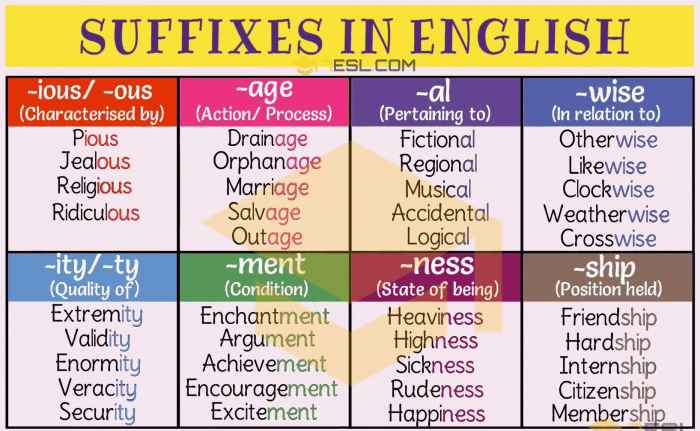
The suffixes ‘-ant’ and ‘-ent’ are commonly used in English to form adjectives and nouns that denote a person or thing that performs a particular action or has a specific characteristic. While both suffixes share some similarities, there are also key differences in their morphological and semantic properties.
Morphologically, the suffix ‘-ant’ is typically added to verbs, while the suffix ‘-ent’ is added to nouns. This difference is reflected in the way that these suffixes affect the part of speech of the word they are attached to. For example, the verb “act” becomes the adjective “actant” when the suffix ‘-ant’ is added, while the noun “agent” becomes the adjective “agentent” when the suffix ‘-ent’ is added.
Semantically, the suffix ‘-ant’ typically denotes an active or performing role, while the suffix ‘-ent’ typically denotes a passive or receiving role. For example, the adjective “actant” describes someone who performs an action, while the adjective “agentent” describes someone who is acted upon.
Examples of Word Pairs that Illustrate the Distinctions Between the Two Suffixes
- Actant (adjective): a person or thing that performs an action
- Agentent (adjective): a person or thing that is acted upon
- Defendant (noun): a person who is sued in a lawsuit
- Defendantent (adjective): relating to a person who is sued in a lawsuit
- Independent (adjective): not dependent on others
- Independentent (adjective): not dependent on others
Examples and Applications of Words with the Suffix ‘-ant’: Words That Have The Suffix Ant
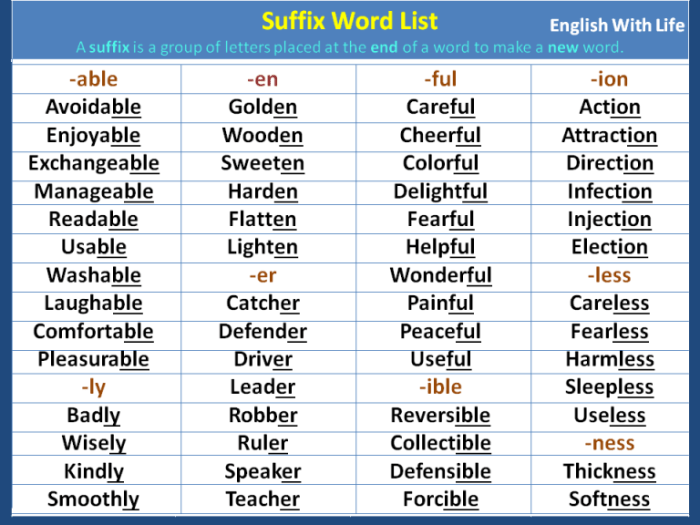
The suffix ‘-ant’ is a versatile affix that can be added to various stems to create adjectives or nouns. These words often denote an agent or person who performs an action or possesses a specific quality.
Here are some common categories of words with the suffix ‘-ant’:
Agents or Performers
- Applicant: A person who applies for something, such as a job or a loan.
- Defendant: A person who is being sued in a legal case.
- Plaintiff: A person who brings a lawsuit against another person.
- Assistant: A person who helps someone else with their work.
- Consultant: A person who provides professional advice.
Possessing a Quality
- Arrogant: A person who is overly proud and self-important.
- Confident: A person who is sure of themselves and their abilities.
- Dominant: A person or thing that is in control or has the upper hand.
- Elegant: A person or thing that is graceful and stylish.
- Fragrant: A person or thing that has a pleasant smell.
Related to Time
- Instant: A moment or a very short period of time.
- Constant: Something that happens all the time or never changes.
- Important: Something that is very significant or valuable.
- Transient: Something that is temporary or does not last long.
- Permanent: Something that is fixed or unchanging.
Commonly Asked Questions
What is the origin of the suffix ‘-ant’?
The suffix ‘-ant’ originates from Latin and Greek, where it was used to form present participles of verbs.
How does the suffix ‘-ant’ affect the part of speech of a word?
The suffix ‘-ant’ typically transforms nouns into adjectives, indicating a specific characteristic or quality.
What is the semantic meaning conveyed by the suffix ‘-ant’?
The suffix ‘-ant’ often denotes a particular attribute, tendency, or ability.
